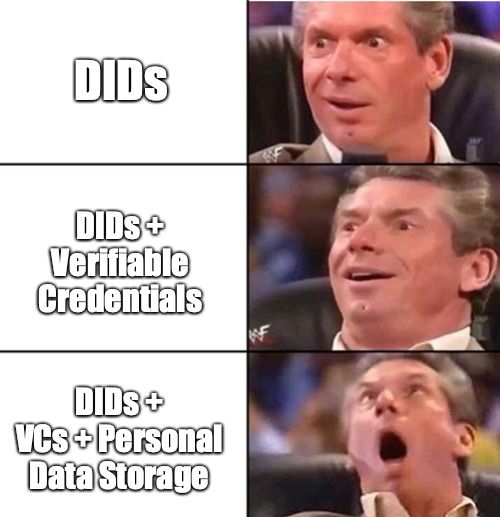Golden Era of Identity
We've now entered the “in it for the tech” phase where attention shifts to builders and a heads down mentality can lead to the creation of some of the most intriguing companies to date.

As they say, history does not repeat itself, but it rhymes.
As a result, we're witnessing an emerging discussion, businesses and services dedicated to, and communities forming around verifiable identities. A fascinating realization that obtaining a clear title to individual digital identity marks a turning point as we evolve into the inevitable extended reality.
A deep and extensive topic previously only debated in the far corners of the web, and among Self-Sovereign Identity (SSI) experts for decades, the emergence of "Decentralized Society" seems to have sparked greater interest in the topic of decentralized identity.
Further work with @pujaohlhaver @glenweyl and myself expanding on what can be done with an ecosystem of soulbound tokens! https://t.co/2lV11270fi
— vitalik.eth (@VitalikButerin) May 11, 2022
Are we entering the golden era of identity?
The State of Identity
Prior to the recent publication of Decentralized Society: Finding Web3's Soul there has been little discussion, yet continuous development, of W3C Decentralized Identifiers, verifiable credentials, and more recently the use of NFTs for identity attributes.
Web3 today centers around expressing transferable, financialized assets, rather than encoding social relationships of trust. Yet many core economic activities—such as uncollateralized lending and building personal brands—are built on persistent, non-transferable relationships. (1)
Refraining from going deep into identity let's instead dive into why this is critically important for the entire application layer of the web, and the revolutionary opportunities that come with such a transformative technology.
Lets begin our journey by first understanding that identity fulfills two of the original objectives for which distributed ledger technology exists:
- Prevention of double spend
- Empowerment from bottom up
With several options at hand, let's use the remainder of this discussion to focus on DIDs and VCs.
What are DIDs?
Decentralized identifiers (DIDs) are a new type of identifier that enables verifiable, decentralized digital identity. A DID refers to any subject (e.g., a person, organization, thing, data model, abstract entity, etc.) as determined by the controller of the DID. In contrast to typical, federated identifiers, DIDs have been designed so that they may be decoupled from centralized registries, identity providers, and certificate authorities. (2)
The foundation of DID is to give back control of identity to internet users (Self-Sovereign Identity) and empower them to generate unique identifiers using the systems they trust. By enabling authentication of these identifiers with cryptographic proofs such as digital signatures, both individuals and organizations can benefit from seamless, secure and private data exchange leveraging blockchain’s distributed ledger technology (DLT).
In today’s digital world, we need to provide critical information to access apps, websites, services and devices. The existing technology of universally unique identifiers (UUID) and uniform resource names (URN) requires a centralized registration authority and isn’t equipped to verify ownership of the identifier cryptographically. As a result, we’re often subject to privacy loss, data theft and other related problems.
If DIDs are the linchpin, then when paired with verifiable credentials and personal data storage a clear title to identity is created that solidifies identity as a core asset that we'll know can't be taken from us.

Societal Adaptation
For societal adaptation to happen we must first understand an environmental shift to digital is underway. On average 7 hours each day is spent online incubating what will ultimately become a digital future reliant on the applications and platforms that command our time.
A total of 5 billion people use the internet today – equal to 63% of the world’s population. (3)
Current trends suggest that two-thirds will be online within a year. Based on recent growth more than 90% of Internet users now use social media every month.
The shift is underway.
With the environmental shift assumption holding true we must now adapt by migration. A digital exploration towards the offerings of verifiable data that include a series of gateways which can best be uncovered by way of opportunities.
Opportunity #1: Creator Economy
Nothing new in the growing technological landscape, a critical component is user participation. Since the dawn of social media, user-generated content has become the foundation of software as we know it.
Each and every one of us is vital to the success of each and every new innovation. From startups seeking product market fit to the behemoth corporations that control nearly all of our interactions online, it's all about the users.
This was the old web, what comes next is vastly different.
What comes next not only offers, but is built from its core foundation to empower users through ownership - Creators will be the first to take advantage of its potential.
A transition to a user-owned internet where you no longer sign into an app to provide maximum output while receiving minimum in return.
Your time is valuable.
Let me explain...
Music
According to the A16z State of Crypto Report in 2021 payouts per creator on popular platforms were $0.10/user on Meta, $636 per artist on Spotify, and $2.47 per channel on YouTube.
In contrast, Decentralized platforms paid out $174,000 per creator.
A staggering comparison, one that may come closer together at scale, yet eye opening to say the least.
In 2021 Spotify and YouTube paid creators $7B and $15B respectively – but the “per capita” disparity compared to web3 is striking:
— a16z (@a16z) May 17, 2022
According to our analysis, web3 paid out $174,000 per creator. Meta paid out $0.10/user, Spotify $636 per artist, and YouTube $2.47 per channel. pic.twitter.com/p2ipeD8Rft
Now that I've got your attention let's stick with Spotify and highlight artists interested in this offering and the emergence of Music NFTs. There is clearly an opportunity for releasing music directly to fans while simultaneously sharing in future success, but introduce identity into the mix and the world gets even bigger.
Hello Super Fans.
What's more valuable to an emerging artist, 100 true super fans or 10,000 streamers hearing a song once at random on a music platform? More than ever before, the value lies in the core true believers.
Numbers obscure nuance. pic.twitter.com/7FutQ07pO5
— Visualize Value (@visualizevalue) May 22, 2022
Introducing DIDs and Verifiable Credentials every artist has the ability to not only know who their super fans are, but also when they became a follower and various interactions along the journey.
Have you ever found yourself in the situation where an artist you've followed from the very beginning gets super popular and you want to tell the world you're the #1 fan? Today all you have is your word. Pretty cool, but what's in it for you?
Each artist can now obtain their own DID and create a page on a decentralized social platform. If you like that artist your follow could be claimed as a verifiable credential. Then, you now have a record of your support for that artist that will most certainly be to your benefit as their popularity grows over time.
As an emerging artist those early fans mean the world. Instead of likes on a page or follows on Twitter (that suggest little more than a number) an opportunity is available to actually engage deeply with true verified fans throughout a career.
Say you wanted to launch a new song.
Immediately from the first release you have a verified record of fans participating in ownership from day 1. You are able to frictionlessly monetize your art in a way never before imagined and begin your journey closely aligned with super fans while the participants get a deeper participation and verified record to add to their verifiable reputation.
Things going well and you plan to go on tour? Artists can seamlessly airdrop VIP tickets to their super fans, or provide access to exclusive merch, or engage with followers based on verified data like never before.
The list of opportunities on both sides of the relationship are fluid and growing in a world available only through decentralized identity.
Opportunity #2: Remote Work
A growing trend thanks to new interactive technologies that emerged during a period where movement was restricted and face-to-face access was non-existent, remote work is an unavoidable result of our environmental shift to digital.
For better or worse we have now entered a world where many employees can live and work anywhere.
today, we’re announcing that airbnb employees can live and work anywhere.https://t.co/wL62IrOxbe
— Airbnb (@Airbnb) April 29, 2022
Where does this transition leave us when it comes to hiring and authenticating our identities?
The OLD way of onboarding is a complicated process consisting of: Updating a resume, searching job listings, submitting a CV and cover letter to prospects, interviewing in person, completing background checks, verifying education history, completing all HR and payroll documentation, THEN go to work.
The NEW way, with verifiable data identity in hand, and ledger verified reputation, the process is slashed. By having a DID assigned to yourself, and Verifiable Credentials building your reputation over time, most onboarding processes can be eliminated.
For example, onboarding would look like this:
Locate opportunity online > Join community and offer services > Allow access to required credentials of your DID > Choose wallet address to receive payment > Begin work immediately.
Hello Verifiable Credentials.
Why do you need to confirm the authenticity of your diploma with every employer? Why do you need to prove your employment history with referrals? Why must you verify your work location with physical ID? These verifications should happen naturally over time as your Web3 identity evolves.
Let me explain...
In a new reputation system there will be tiered credentials that allow every user to acquire verifications over time, carrying varying weights, and accessible at the owners' discretion.
Say you went to Harvard University and seek a job at a Fortune 100 company. The employer will require that your degree be validated by the university itself. But, what if in contrast you seek a local job where having classmate validation is enough to prove your degree? Either way, the onboarding process should be frictionless and indistinguishable.
The advantage of this new environment powered by decentralized identities is that every interaction throughout your digital life, and extensive time spent online, actually mean something.
On one occasion in the virtual world you might interact with 10 of your classmates who've been verified by your university. You see this on their reputations and send requests for each to verify you also went to Harvard. 7 out of 10 approve your verifiable credential and your reputation has grown!
The following week you might be spending time on a different platform and stumble upon a previous employer. Already going through the hiring process they know your history so again you request they verify you went to Harvard. Another verifiable credential approved and organic step in your reputation history!
A month later you apply to a job and it just so happens that you've met the education requirements simply by having enough Verifiable Credentials through previous interactions online to bypass their lengthy hiring process.
What we do online is valuable.
Our time and our interactions mean something. By owning a DID powered identity that we create, and building a reputation through credentials over time, the opportunities are limitless.
The societal adaptation has already begun, and migration to a new digital environment is underway, now we must all work together to understand the importance of identity powered by verifiable data and journey together towards a better future online.
(1) Weyl, Eric Glen and Ohlhaver, Puja and Buterin, Vitalik, Decentralized Society: Finding Web3's Soul (May 10, 2022). Available at SSRN: https://ssrn.com/abstract=4105763
(2) Decentralized Identifiers (DIDs) v1.0: Core architecture, data model, and representations (August 3, 2021). https://www.w3.org/TR/did-core/
(3) Digital Around the World (April 2o22). https://datareportal.com/global-digital-overview